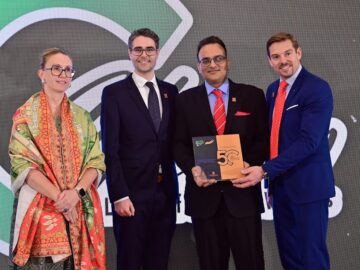OCBC Bank has launched OCBC SME Sustainable Finance Framework that makes it simpler and less costly for Singapore small and medium enterprises to access sustainable financing of up to S$20 million to accelerate their sustainability plans.
SMEs will no longer need to spend time and resources to develop bespoke sustainable finance frameworks, prior to applying for sustainable financing, to show that the proceeds will be deployed in accordance with internationally recognised green standards.
The OCBC SME Sustainable Finance Framework is for SMEs that are involved in sustainable activities across eight “green project categories” eligible under the Green Loan Principles by the Loan Market Association.
These categories are clean transportation; eco-efficient and/or circular economy adapted products, production technologies and processes; energy efficiency; green buildings; environmentally sustainable management of living natural resources and land use; pollution prevention and control; renewable energy; and sustainable water and wastewater management.
To ensure that a wider group of SMEs can access sustainable financing, the new framework is also applicable to projects in these eight categories that do not have internationally or nationally recognized sustainable certification schemes established. An example is the Building and Construction Authority’s “Green Mark Scheme”.
The new framework was supported through the Monetary Authority of Singapore’s Green and Sustainability-Linked Loan Grant Scheme.
The sustainable financing provided through this new framework can be in the form of solutions such as green loans, green letters of credit and green banker’s guarantee.
Linus Goh, head of global commercial banking at OCBC Bank, notes:
“This framework is designed to make it simple for SMEs to access green financing for their businesses and projects, without the complexity and cost of establishing a customized framework for each company.
“We believe this will help our SME customers accelerate their sustainability plans – both the SMEs which are enabling the change of industries and businesses as service providers in sustainability-linked efforts such as renewable energy, sustainable water and waste water treatment, as well as SMEs across all industries which are beginning to evaluate and adopt sustainability practices in their businesses, directing investments into green businesses, technology and infrastructure.”
Joris Dierckx, chief executive officer of BNP Paribas Singapore, comments:
“Singapore is Asia’s top logistics hub offering world-class connectivity. With the unprecedented boom in regional cross-border trade and with the challenges that Covid-19 has brought to the supply chain network, we believe that it is crucial for banks to increase their efforts to help clients incorporate sustainable supply chain practices. Banks that pioneer best practices in this area can help to facilitate a cascade of positive change that will flow throughout supply chain and global trade networks.”











